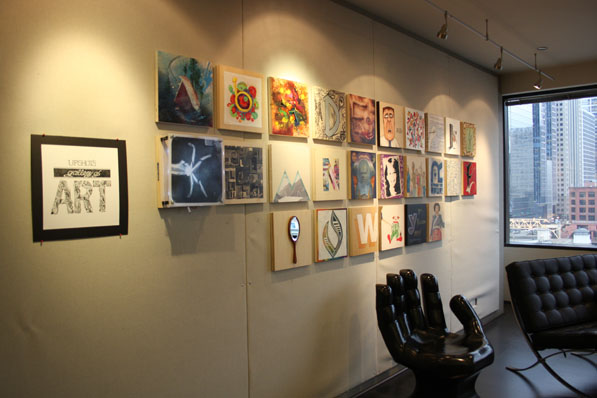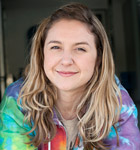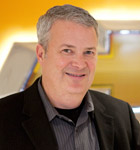According to a 2011 Gallup survey, 71 percent of workers hate their jobs. For these people, life begins when they exit the office every day around 5 o’clock. Still, a select few companies do things out of the ordinary to make their employees look forward to coming to work each day. Upshot, a Chicago-based integrated marketing agency with a number of big-brand clients including Hilton, Kraft Foods, Procter & Gamble, and Corona, is one of those rare companies. At Upshot, work and play are closely intertwined, creating a very unique culture where employees not only work together to produce brilliant marketing campaigns for their clients, but where they laugh, dance, eat pie, and compete for the title of Long Jump Champion.
The best part? The monkey business is not going on behind the boss’s back. “Whether our office games are organic or organized, they make our employees happy, keep them laughing, and most importantly, keep them engaged with Upshot,” explains Brian Kristofek, CEO. “Engaged employees tend to produce better work, so we’ll keep the games going.”

Pie eating contests, makeshift long-jump competitions, and other games are just one way Upshot engages and unites its employees. The company uses many different strategies to bring its team together and create a fun, dynamic working environment—so much so that one of Upshot’s top priorities is to become one of the top 10 places to work on the Great Place to Work rankings, which are presented by Entrepreneur (Upshot was ranked 24 in 2011). “It won’t be easy, but we are committed to achieving this lofty goal,” Kristofek says. “As a matter of fact, being a ‘top 10’ place to work is a key part of the agency’s business plan—it’s one of our objectives.”
 The agency also views its wellness program and internal communications as important components of employee engagement. “So is having a robust talent pipeline, a generous employee-referral program, and a solid review process that helps us hire and retain the best talent,” Kristofek adds.
The agency also views its wellness program and internal communications as important components of employee engagement. “So is having a robust talent pipeline, a generous employee-referral program, and a solid review process that helps us hire and retain the best talent,” Kristofek adds.
Upshot also places a lot of importance on employee development and delivers training on many levels, including an ongoing curriculum called Brain Camp, Lunch & Learns, and bringing in outside coaches and speakers. “Growth fuels career opportunity, and everyone at Upshot knows the correlation,” Kristofek says. “We also introduced a new organizational structure that will provide new opportunities throughout the organization.”
Upshot’s secret to creating happy staffers lies in its ability to get people excited about their work, the company, and being part of a team. “Upshot’s purpose is to inspire people to take action,” Kristofek says. “We are here to fan the flames of inspiration. It’s part of our culture, it’s part of our marketing, it’s our purpose, and it’s why we come to work every day.”
The company’s happy workers are high performers, and its engagement strategies translate to a productive, efficient team that consistently delivers groundbreaking ideas and clever campaigns that wow clients. Noteworthy projects to date include a unique beauty brand campaign created for Procter & Gamble—which became the first pop-up environment in North America—and the “Corona Beach Getaway” campaign for Corona—which served as Upshot’s first national promotion.
But while Upshot measures project and account success through client feedback, it also gauges its progress on culture through an annual employee survey. Staff are expected to follow a set of 10 tenets—including “Be a Resource,” “Take a Risk,” and “Never Give Up”—intended to guide how the team operates in its workplace and empower employees. “I think what makes Upshot most unique among other companies with strong cultures is its people-focus,” Kristofek explains.
Landing on the top 10 places to work list is simply a measuring stick, Kristofek says. “The real driver for me is walking through the doors of Upshot every day and feeling the positive mojo that a great culture and happy, engaged people generate. You can sense it when you walk through the office, interact with employees, and view the work. In the highly competitive agency business, it becomes a point of differentiation.”

